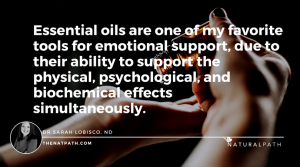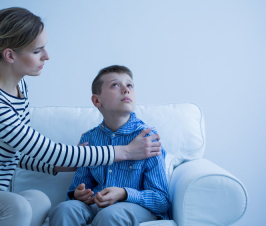In Part I, I discussed the prevalence of major depression in America and that the current approach to “fix” mood imbalances with a pill is not effectively addressing the root cause.
 I reviewed a recent study that discovered that a receptor for stress was elevated in those with major depression. The researchers found further evidence for their results by studying mice. Rodents who had higher levels of GPR158 were also more susceptible to depression after chronic stress. The researchers implied that their results may lead to better drug discoveries that can manipulate this receptor to prevent depression.1
I reviewed a recent study that discovered that a receptor for stress was elevated in those with major depression. The researchers found further evidence for their results by studying mice. Rodents who had higher levels of GPR158 were also more susceptible to depression after chronic stress. The researchers implied that their results may lead to better drug discoveries that can manipulate this receptor to prevent depression.1
The study authors did not mention addressing the factors that may be causing the stress. There was also no discussion that biochemical individuality, lifestyle factors, and one’s environment may impact the outcomes of having higher levels of GPR158.
Now, I will review the second recent study on depression that similarly to the first study, demonstrates that providing a pill for depression is not the answer to helping Americans feel better. In fact, it could cause more harm than good, especially for the heart.
Dying to Be Happy with a Bad Heart
In a recent report, it was found that heart attack patients given antidepressants for one year had a greater risk of death compared to controls. Science Dailyreported:
A total of 565 (6.3%) patients received antidepressants at discharge from hospital. Compared to those who did not receive the drugs, patients prescribed antidepressants were predominantly female, older, and more likely to have hypertension, diabetes, dyslipidaemia, obesity and comorbidities. They were less likely to undergo percutaneous coronary intervention or receive P2Y12 blockers or statins, and stayed in hospital longer.
After adjusting for baseline characteristics the researchers found that the rates of stroke and subsequent heart attacks were similar between the two groups, but patients prescribed antidepressants had significantly worse survival. The rate of all-cause mortality at one-year after discharge was 7.4% in patients prescribed antidepressants compared to 3.4% for those not prescribed antidepressants (p<0.001).
Antidepressant prescription was an independent predictor for mortality, and increased the odds by 66% (odds ratio: 1.66; 95% confidence interval: 1.16 to 2.39).2
Could it be that the very factors that caused the depression could also be linked to the heart attack?
Perhaps suppressing the symptom of low mood made patients and physicians less motivated to address the other physical, emotional, or lifestyle factors implicated in the heart-brain connection?
Looking Beyond the “Feel Good Pill”
There are an infinite number of interfering aspects that are involved in how the brain functions and associated moods that result. As stated in one of my previous blogs, include:3
- Inflammation4 and oxidative stress5
- Genetic variations6 (such as SNPs related7 to MTHFR,8 DRD2, DRD49, COMT, CBS, serotonin transporters (5HTT)10)
- Nutrition and assimilation11
- Dietary triggers12 and deficiencies (including cerebral folate deficiency13)
- Mitochondrial dysfunctions14 and imbalances15
- Hormonal imbalances16
- Stress & cortisol levels17
- The microbiome18
- Environmental toxicants19
- Blood sugar levels20
- Stealth infections21
- Childhood adversity22
- Emotional tone and spirituality23
- Brain trauma24
- Hyper or hypo-activity in a brain region25
- …and more!
Just treating the symptom of depression with a pill won’t take into account all the above factors that can impact overall brain health and mood. This is important because depression is associated with physical changes in the brain.26 One review article in Nature found that MDD is associated with small hippocampal volumes, an area in the brain linked to memory and other vital brain functions.26 Just treating the symptom, will not treat the brain effects.
An overriding tendency in medicine27 is to look at health as the absence of a physical condition while ignoring the mind-body, heart-brain connection. The HeartMath Institute has proven that being in a state of coherence, the synchronization of our physical, mental, and emotional systems, can align to better emotional resiliency and wellness benefits.
The good news is that all of these factors can be positively influenced through lifestyle, mind-body support, and wellness tools, such as essential oils. I’ve provided a whole series on heart health and discussed the importance of healthy relationships, which is often ignored, on cardiovascular outcomes. Our connections to others can also be fostered, nourished, and remedied, but some effort and willingness to participate is involved.
Other methods and tools have been used to increase neuroplasticity in our brains and allow them to be healthy and more optimized, resulting in less mental distress.
Highlighting My Favorite Wellness Tool
Essential oils are one of my favorite tools for emotional support, due to their ability to support the physical, psychological, and biochemical effects simultaneously. Below are some articles that I have written that reviews some of the research on these topics (more can be found on my database):
- Eating, Exercise, and Essential Oils for Brain Health and Preventing Cognitive Decline
- A Quick Video Review of the Neurophysiology of Smelland the Brain
- How Essential Oils Impact Mood and Emotions (This link features an intriguing review on essential oils with Alzheimer’s patients.)
- The Many Uses of Essential Oils for Health
- Can Essential Oils Help Change Unwanted Behavior and Balance the Brain?
- Sesquiterpenes- a Long Word, a Cool Constituent in Essential Oils
Summary and Conclusion
The bottom line is that until we look at our current lifestyle factors and how we connect to others on an individual basis, a pill is just covering the symptoms of any mental disorder. One drug that manipulates one biochemical pathway will never be able to affect all the factors involved at once or influence all 3 levels of health, and modify stress responses, like essential oils and lifestyle practices.
The solution is multifactorial. Essential oils cannot do the work for us to fix unhealthy relationship patterns, but they can support us in better responses and behaviors by supporting emotional reactions.
Sometimes people may need to support a biochemical balance through a medication, I am not against that; however, we need to get to the root cause of why someone is feeling down and support and nurture their lifestyle, environment, and relationships.
Without looking at a broader viewpoint, we are living in a society of fear that is driven by self-soothing. Rather, we need to be promoting connection and assessing all factors involved on an individual basis in order to find lasting solutions.
References:
- Sutton LP, Orlandi C, Song C, et al. Orphan receptor GPR158 controls stress-induced depression. eLife, 2018; 7 DOI: 7554/eLife.33273
- European Society of Cardiology. Heart attack patients prescribed antidepressants have worse one-year survival. Science Daily. March 3, 2018. https://www.sciencedaily.com/releases/2018/03/180303095445.htm
- http://dr-lobisco.com/alzheimers-disease-essential-oils-for-brain-health-exercise-and-diet/
- http://www.ncbi.nlm.nih.gov/pubmed/24468642
- http://www.hindawi.com/journals/omcl/2015/898393/
- http://www.ncbi.nlm.nih.gov/pubmed/23775054
- http://dr-lobisco.com/toxic-stats-protective-facts/
- http://www.ncbi.nlm.nih.gov/pubmed/18628678
- http://www.ncbi.nlm.nih.gov/pubmed/9603615
- http://www.ncbi.nlm.nih.gov/pubmed/18628678
- http://www.ncbi.nlm.nih.gov/pmc/articles/PMC2248201/
- http://dr-lobisco.com/whole-food-whole-body-whole-mind-stress-busting-tips/
- http://www.drkarafitzgerald.com/2014/05/01/autism-and-cerebral-folate-deficiency/
- http://www.ncbi.nlm.nih.gov/pubmed/22579150
- http://www.ncbi.nlm.nih.gov/pmc/articles/PMC3640606/
- http://dr-lobisco.com/mood-imbalances-part-ii-the-estrogen-serotonin-connection/
- http://dujs.dartmouth.edu/fall-2010/the-physiology-of-stress-cortisol-and-the-hypothalamic-pituitary-adrenal-axis#.Ux4TyIVp1IE
- http://dr-lobisco.com/microbiome-insights-for-the-not-so-dummies/
- https://ndnr.com/anxietydepressionmental-health/toxicity-and-depression/
- http://care.diabetesjournals.org/content/23/7/934.long
- http://www.ncbi.nlm.nih.gov/pmc/articles/PMC2740752/
- http://www.sciencedaily.com/releases/2015/01/150120142817.htm
- http://www.ncbi.nlm.nih.gov/pmc/articles/PMC3115283/
- http://www.ncbi.nlm.nih.gov/pmc/articles/PMC2536546/
- http://www.amenclinics.com/the-science/spect-gallery/attention-deficit-disorder-addadhd/
- MacQueen G, Frodl T. The hippocampus in major depression: evidence for the convergence of the bench and bedside in psychiatric research? Molecular Psychiatry. 2011; (6): 252–264. doi:10.1038/mp.2010.80
- Brüssow H. What is health? Microbial Biotechnology. 2013;6(4):341-348. doi:10.1111/1751-7915.12063.
Image Copyright: <a href=’https://www.123rf.com/profile_ximagination’>ximagination / 123RF Stock Photo</a>
 Sarah Lobisco, ND, is a graduate of the University of Bridgeport’s College of Naturopathic Medicine (UBCNM). She is licensed in Vermont as a naturopathic doctor and holds a Bachelor of Psychology from State University of New York at Geneseo.
Sarah Lobisco, ND, is a graduate of the University of Bridgeport’s College of Naturopathic Medicine (UBCNM). She is licensed in Vermont as a naturopathic doctor and holds a Bachelor of Psychology from State University of New York at Geneseo.
Dr. LoBisco is a speaker on integrative health, has several publications, and has earned her certification in functional medicine. Dr. LoBisco currently incorporates her training as a naturopathic doctor and functional medicine practitioner through writing, researching, private practice, and through her independent contracting work for companies regarding supplements, nutraceuticals, essential oils, and medical foods.
Dr. LoBisco also enjoys continuing to educate and empower her readers through her blogs and social media. Her recent blog can be found at www.dr-lobisco.com.


















My question is: why hadn’t the women received anti Heart
attack medicine and treatment before attact or in the hospital? Was it because the doctors still didn’t it seriously enough and gave them depression medicine INSTEAD OF proper medicine/treatment and THAT IS WHY they had worse outcomes?